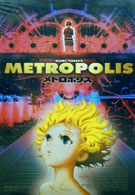In the future, robots and humans live together, but not harmoniously. Powerful political mind Duke Red, the leader of a fascist organization known as the “Mardu,” plans to rule all robots (and thus the world) from a newly built art-deco tower known as the Ziggurat. He believes that his plan will succeed only if a supreme being, in the form of a robotic reincarnation of his deceased daughter, Tima, takes the throne to lead the Ziggurat to victory. When the scientist giving life to Tima is killed in a fire set by Duke Red’s adopted son, Rock, Japanese detective Shunsaku Ban and his young nephew Kenichi set out to uncover the conspiracy.
Based on a classic 1949 comic-book by Osamu Tezuka and loosely based on the 1927 silent epic by master filmmaker Fritz Lang, this animated remake of Metropolis is every bit as insightful as it is entertaining. It is a compelling tale of love and betrayal, yet delivers a classic science-fiction adventure. Metropolis never lets itself be overwhelmed by the breathtaking landscape that would make even Ridley Scott envious. Many American science-fiction epics are guilty of letting production design become the most important element of the film, entrancing viewers with massive towers and eye-catching colors. Sometimes this method works too well and the setting becomes the main character in the film. Director Rin Tarô has enough faith in the themes of his near-Shakespearean epic to make Metropolis one of the most important animated films ever made.
The most haunting element is the relationship between Duke Red and his kin. Young, hotheaded Rock considers the Duke his birth father, but the Duke continues to insist that because he found the young boy abandoned years ago, he is merely a guardian. When Rock learns of his father’s plans for the Ziggurat, he is angered by being unable to gain the love of a father because of rivalry with an articulated assortment of metal and wiring.
This is an ingenious future-noir that goes back to the early days of the great mystery. Important layers of the plot are peeled off like an onion and the result is a revelation that appears worse and worse with every passing moment. With a unique approach of melding sci-fi with mystery, Metropolis could be classified alongside Blade Runner. The difference here is that Ridley Scott’s famed sci-fi film lacked the emotional warmth to match the sumptuous, unforgettable images.
The greatest value of Metropolis is that it has that rare power to make you love something that is unreal: a robot. Only in films like Terminator 2: Judgment Day and A.I. Artificial Intelligence has a filmmaker set out to bond the viewer with a synthetic being. The result is heartbreaking: Tarô proves that love knows no boundaries when our young hero Kenichi falls in love with the robot girl, Tima. In a future where human beings have grown angry with their mechanical counterparts, Metropolis becomes a futuristic “Romeo & Juliet” of sorts. Kenichi and Tima cannot possibly live together happily because their world will never allow them to.
In some instances, the dialogue from the English dubbing has the cold, overly relaxed feel of a typical Japanese monster movie. You almost get the impression that these characters do not consider a threat to the world an emergency. The bland tone of the voices is not enough to take away from the film, since I walked away with a basic understanding of the situation. This is thanks largely to the dialogue itself. A casual viewer would be best off going with the original language track (subtitled, of course) when viewing a foreign film.
Despite Metropolis achieving a quality that few animated films reach, it will most likely suffer financially in the United States because it is a relatively unheard-of Japanese import. The shame is that, in contrast, so many poor animated films have received wider distribution within the past few years and disappointed hopeful young viewers. If a big-budget animated epic like Metropolis received a wide distribution, it could become the sleeper sensation of the year. Alas, that will never happen. Even a studio as risk-taking as Sony will not release this film wide. Those few who see it, whether in theaters or on home video, should spread the word. Maybe the next time a film like Metropolis comes along, we can all enjoy it on a big screen.
Your Daily Blend of Entertainment News





